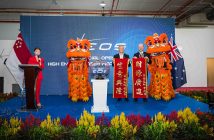Nearly all citizens surveyed by Accenture in Australia (90 percent) say they are willing to share their biometric details – the unique physical characteristics, such as fingerprints, that can be used to verify peoples’ identities and automate recognition – when they are traveling across international borders. However, the majority (65 percent) of the survey’s respondents say they have not shared any biometric information to date.
Australian respondents believe biometrics can play a significant role in facilitating faster and more secure travel while protecting borders. When asked about specific benefits of sharing biometrics more than half (65 percent) of those surveyed say they would share their biometric information to help improve border security, 61 percent say they would share such information if it made border processing faster and more efficient and 59 percent say they would share their biometrics if it made travel more convenient.
Smart Borders
More than half (65 percent)of those surveyed in Australia said they would likely share their biometric details to enable participation in Registered Traveller Programs (RTP’s) that allow pre-registered passengers to have faster and easier processing through customs and border control. This contrasted with Germany and Japan, where less than half (44 percent in Germany and 49 percent in Japan) of respondents said they would partake in a similar RTP.
Automated Border Clearance (e-gates)
When asked about the use of automated border clearance solutions, such as e-gates at airports and border crossings, more than one quarter of Australia’s respondents said they had used an e-gate in the past. At 31 percent, Australia has the second highest number of people behind France at 38 percent. A majority of those who have used an e-gate (79 percent) said they had a positive experience, and 87 percent of e-gate users found them faster than manual border clearance checkpoints managed by a border patrol officer.
Despite citizens’ support for biometrics and the greater use of technology to facilitate travel, a majority of respondents from Australia (75 percent) said that prior to deciding to support the use of biometric information to verify the identities of those at border crossings, they would want to know what security measures are in place to protect the data, and almost three-fourths (74 percent) of Australian respondents would want to know how their personal information is being used.
“The findings of this survey show that Australians would strongly support an increased use of technology to facilitate travel, verify identities and secure national borders,” said Melissa Waldron who leads Accenture Australia’s Border and Identity Services business.
“Australia should strive for increasing the adoption and greater use of technology to ensure the continual improvement of the personal travel experience and ongoing security of Australia’s borders,” added Ms Waldron.
Methodology
Accenture surveyed a total of 3,001 citizens in the US, UK, France, Germany, Australia, and Japan from April 14th to April 28th, 2014 via an online quantitative survey. The research was fielded by Penn Schoen Berland (PSB) to capture general citizen attitudes toward biometrics, especially as they might be applied to border control and travel. The overall margin of error for the study is ±1.79 percentage points at the global level and ±4.38 at the individual country level.
About Accenture
Accenture is a global management consulting, technology services and outsourcing company, with more than 293,000 people serving clients in more than 120 countries. Combining unparalleled experience, comprehensive capabilities across all industries and business functions, and extensive research on the world’s most successful companies, Accenture collaborates with clients to help them become high-performance businesses and governments. The company generated net revenues of US$28.6 billion for the fiscal year ended Aug. 31, 2013. Its home page is www.accenture.com.





